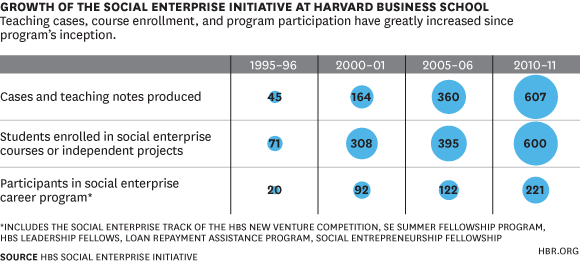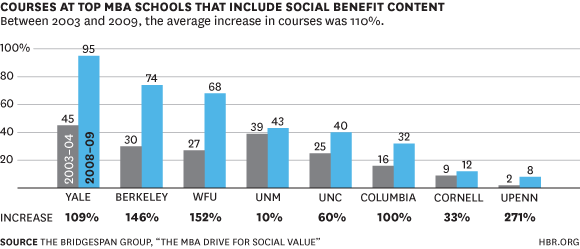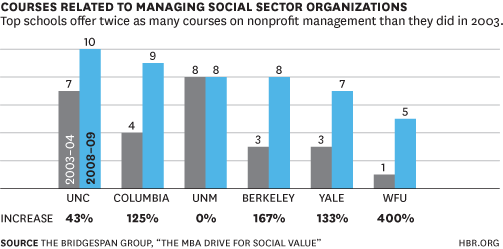This post originally appeared on the HBR-Bridgespan Insight Center on Scaling Social Impact.
By Katie Smith Milway and Christine Driscoll Goulay
Twenty years ago, on two different business school campuses a continent away, the seeds of social entrepreneurship were planted.
At INSEAD, two students Philippe Dongier and Katie (co-author of this post) sent a school-wide email asking if anyone was interested in cultivating coursework and careers related to nonprofits. Overnight, 126 students, staff, and faculty responded — a number equal to 50% of the newly arrived class. With a student-faculty steering committee and 50,000 Euros of seed funding from the school's administration, they founded INDEVOR, INSEAD's social enterprise club.
Across the pond, John Whitehead, the former managing partner of Goldman Sachs and the board chair for several nonprofits, approached the dean of Harvard Business School with a similar idea. He asked how could HBS apply its distinctive competencies to help improve management within the social sector? Over the next few years, he provided small amounts of money to seed experiments and to challenge the institution to come up with innovative approaches to address his question. Like a venture capitalist, he said if these experiments delivered on their goals, more funding would follow. From this, the Social Enterprise Initiative was born.
In Europe, the seed planted at INSEAD grew steadily over the years and led to the development of the INSEAD Social Entrepreneurship Initiative, which now coordinates conferences and other forums, sponsors research, and supports students to learn more about the link between social impact and business.
In Boston, the HBS Social Enterprise Initiative was experiencing a similar growth trajectory.

INSEAD and HBS aren't the only schools where the drive for social change has taken hold. Across all of the top MBA programs there has been soaring interest in social enterprise in recent years and schools have grown their offerings to meet the demand, as this data from The Bridgespan Group shows.

Dr. Nora Silver, the director of the Center for Public and Nonprofit Leadership at UC Berkeley Haas School of Management, which today offers nine courses specifically related to social or public sector management (up from eight at the time of the Bridgespan study), told us, "This generation of students is the first that was required or expected to do community service in high school and college. These students grew up expecting to integrate social impact into their work — no matter what sector they join."

Across the programs studied, Yale School of Management topped the chart with 95% of its course offerings in 2009 incorporating social benefit content.
Faculty interest has grown too, fueling research with social sector practitioners, which translates into new cases and discussion for the classroom. Valerie Malter, Director of Social Impact at the Wharton School at the University of Pennsylvania noted in the Bridgespan study: "The level of interest from faculty members is extraordinary in this whole area."
MBA programs today are minting not just captains of industry, but also crusaders for social good. Any program teaching business skills needs to train their graduates to serve both companies and society. This means equipping would-be entrepreneurs with an understanding of multiple bottom lines and equipping would-be corporate professionals with intrapreneurial vision to connect business interests to social value. Steeped in both social and business principles this new breed of MBAs will be able to navigate complexity and create opportunities to sustain the world we live and work in.
Katie Smith Milway, a partner at The Bridgespan Group, was co-founder of INDEVOR, INSEAD’s social enterprise club, and the founding publisher for Bain & Company. Christine Driscoll Goulay is director of the Social Entrepreneurship Initiative at INSEAD.

